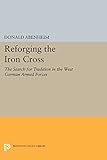Reforging the Iron Cross : The Search for Tradition in the West German Armed Forces / Donald Abenheim.
Material type: TextSeries: Princeton Legacy Library ; 943Publisher: Princeton, NJ : Princeton University Press, [2014]Copyright date: ©1989Edition: Course BookDescription: 1 online resource (340 p.)Content type:
TextSeries: Princeton Legacy Library ; 943Publisher: Princeton, NJ : Princeton University Press, [2014]Copyright date: ©1989Edition: Course BookDescription: 1 online resource (340 p.)Content type: - 9780691602479
- 9781400859771
- 322.50943
- UA710 -- A594 1988eb
- online - DeGruyter
- Issued also in print.
| Item type | Current library | Call number | URL | Status | Notes | Barcode | |
|---|---|---|---|---|---|---|---|
 eBook
eBook
|
Biblioteca "Angelicum" Pont. Univ. S.Tommaso d'Aquino Nuvola online | online - DeGruyter (Browse shelf(Opens below)) | Online access | Not for loan (Accesso limitato) | Accesso per gli utenti autorizzati / Access for authorized users | (dgr)9781400859771 |
Frontmatter -- Contents -- Illustrations -- Abbreviations -- Foreword -- Acknowledgments -- Introduction -- PART ONE: THE NEW ARMY AND THE PAST -- 1. The Maintenance of Tradition and the Burden of the Past -- 2. The "Magna Carta" of the Bundeswehr: Tradition and Reform -- 3. The European Army and the Dienststelle Blank·. Problems and Personalities -- 4· Count Baudissin and an Army without Pathos -- 5. The Meeting at Siegburg and the Discipline Genemle-. "What Should Be Handed Down?" -- 6. The Bundestag Security Committee Takes Up the Issue -- 7. The Personnel Screening Boards: The Twentieth of July 1944 -- 8. Count Baudissin's Answer: The First Courses at Sonthofen, Cologne, and Koblenz -- PART TWO: THE DECREE ON TRADITION -- 9. "Inner Strangulation": The Troops and the Reforms -- ίο. Death's Head and St. Hubertus Cross: Unit Lineage and Honors -- 11. Early Drafts of the Decree: The Role of Theodor Heuss and the Council on Innere Fuhrung -- 12. The Search for Franz-Josef Strauss's Image of History -- 13. Colonel Wagemann Completes the Decree -- 14. "What Is a Valid Heritage?" First Reactions to the Decree -- PART THREE: A NEW GENERATION SEEKS ITS VALID HERITAGE -- 15. Transition and Open Conflict, 1966-1972 -- 16. The Fate of the Traditions Decree and the Rise and Fall of Its Successors, 1976-1986 -- 17 Conclusion: AValid Heritage -- Bibliography -- Index
restricted access online access with authorization star
http://purl.org/coar/access_right/c_16ec
Recent controversies about Ronald Reagan's visit to the Bitburg military cemetery and revelations about Kurt Waldheim's past underscored the political problems inherent in Germany's military traditions and in the relationship of the army to National Socialism. The Allied victors disbanded the German armed forces after World War II, only to press for the arming of the Federal Republic of Germany under the altered political conditions of the cold war. This book is the first comprehensive narrative and analysis of the efforts of German military professionals to discover for their new army an acceptable body of tradition in the proud, ambiguous, and at times criminal history of the German soldier.The author shows that, despite a complex of political obstacles, the founders of the Bundeswehr generally succeeded in persuading the international community and Germany itself that the army of the 1950s and 1960s would not revive the militarism of the past. However, the rapidity of the military buildup was a major drawback to their reform ideas. Certain officers and NCOs in the Bundeswehr undercut changes made by the leadership, and the debate on tradition building became a major political issue in the Federal Republic and NATO.Originally published in 1989.The Princeton Legacy Library uses the latest print-on-demand technology to again make available previously out-of-print books from the distinguished backlist of Princeton University Press. These editions preserve the original texts of these important books while presenting them in durable paperback and hardcover editions. The goal of the Princeton Legacy Library is to vastly increase access to the rich scholarly heritage found in the thousands of books published by Princeton University Press since its founding in 1905.
Issued also in print.
Mode of access: Internet via World Wide Web.
In English.
Description based on online resource; title from PDF title page (publisher's Web site, viewed 30. Aug 2021)


